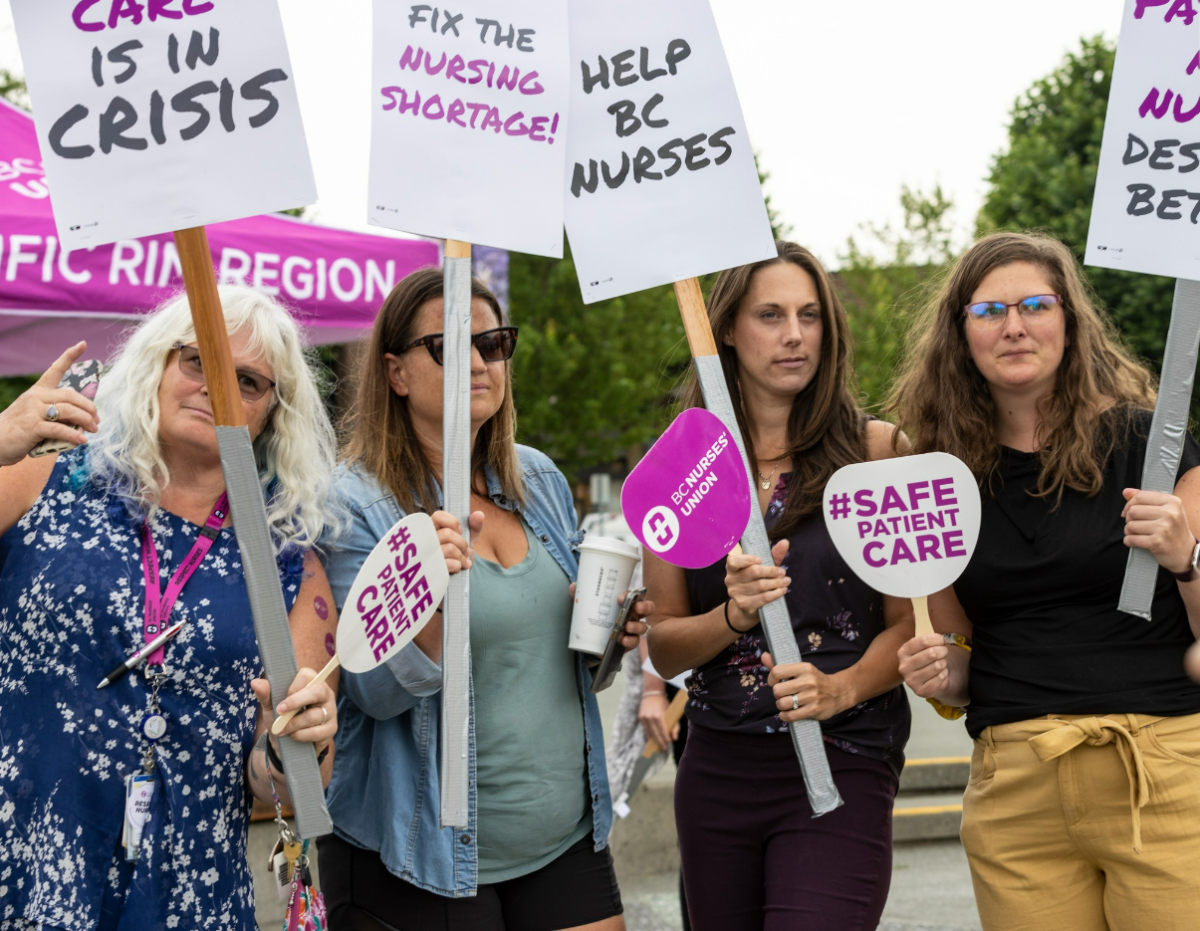The British Columbia Nurses’ Union is sounding the alarm as its members at the East Kootenay Regional Hospital increasingly find themselves working between 115 and 133 per cent overcapacity.

The startling figures are based on acceptable ratios of nurses to patients, which fluctuate based on regional staffing shortages, the number of patients, and the nature of their care needs.
The union is meeting in Cranbrook on Thursday with nurses who are “stretched thin,” it said in a news release. Municipal leaders, MLAs and medical professionals will join them to discuss the “crisis” and brainstorm long-term solutions.
According to the union, at the East Kootenay Regional Hospital, nurse staffing sometimes sits as low as 50 per cent, putting patient care at risk. The situation has been exacerbated by periods of emergency department closures or diversions at the Creston Valley Hospital and Elkford Health Centre.
“Government current and past didn’t listen to the experts that predicted that we would find ourselves in this critical nursing shortage at some point, and have not invested in nursing,” BCNU union vice-president Adriane Gear told Global News.
“Nurses cannot bear the burden of this any longer, they cannot work any more overtime than they’re already doing. They just can’t sustain it.”

Global News reached out to Interior Health for comment on this story but did not receive a response.
In a written statement, the B.C. Ministry of Health said it recognizes nurses have faced increased strain since the pandemic, and health-care systems across the world are experiencing it too.
In its last budget, a spokesperson said B.C. dedicated $66 million over three years, with steady-state annual funding of $46.3 million by 2024, to add a targeted 3,000 full-time equivalent positions to health programs, including nursing and midwifery.
“This is not something that we will be able to fix overnight, but it is something that we are working on as efficiently and effectively as possible to ensure we are supporting our nurses, patients, and the people of British Columbia,” the spokesperson wrote.
In a Tuesday interview, Dix also told Global News that since he took on the Health Department’s top job, 38,000 new staff have joined the health-care system, including 600 new doctors, to better address patient care. He cited record numbers of new registered nurses in the province, and “more primary care appointments, more emergency room visits, more surgeries, and more diagnostic care than ever before.”
- Buzz kill? Gen Z less interested in coffee than older Canadians, survey shows
- ‘She gets to be 10’: Ontario child’s heart donated to girl the same age
- Canada updating sperm donor screening criteria for men who have sex with men
- Bird flu risk to humans an ‘enormous concern,’ WHO says. Here’s what to know
To alleviate pressure on the system, he added, B.C. is working to resolve overhead costs and the fee-for-service issues identified by family doctors, and to attract new domestic and international physicians.
According to Gear, however, B.C. has no “health human resources strategy” in place. She said it’s true that the number of new nurses in the province has increased, but those rates are far from keeping up with attrition or population growth.
She also acknowledged several “glimmers of hope” from the provincial government, including an addition of 602 new nursing seats, and $12 million to streamline the recruitment of internationally-trained nurses, but said there aren’t enough nursing instructors, assessment officials, or course upgrade opportunities to make the most of those initiatives.
“The other big part of that is how do we retain the nurses we have in the system? Because that’s a huge conversation that needs to take place,” she explained. “We are bleeding nurses.”

While emergency department closures in the region may not have been as bad as in other parts of the province, Gear said the BCNU is trying to prevent the situation in Creston, Cranbrook and Elkford from “further deterioration.”
She said she is aware of one nurse in the area who has worked more than 15 shifts while on vacation, aware that if she did not work, an entire emergency department could shut down. In small, rural hospitals and health centres, Gear explained, the presence of a single nurse can make the difference between an open department and a diversion.
“They can’t simply double the workload and manage to do something, and certainly in the ICU this has been a much more common situation,” said Gear.
The result, the union leader added, has been an increase in early retirement from nurses, nurses leaving full-time positions in favour of casual or part-time work, and early career nurses leaving the profession altogether after one or two years.
“Nurses are feeling so disillusioned because there’s really not an acknowledgment of how bad it is, and yet nurses cannot speak out or share what’s going on because they will be disciplined,” she said.
“We’re also anonymously recording their stories. That’s another reason we’re up here, because they’re can’t tell their stories but the union can.”
As it stands, Gear said there are nearly 4,300 permanent nursing vacancies in B.C., which is expected to need more than 26,000 nurses by 2031 in order to meet patient needs.




Comments